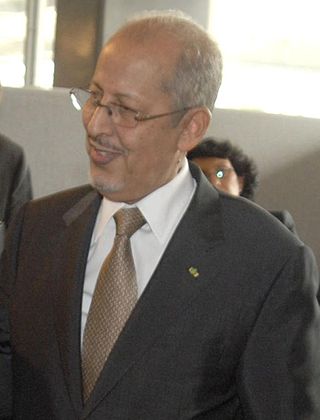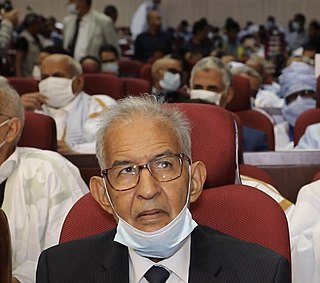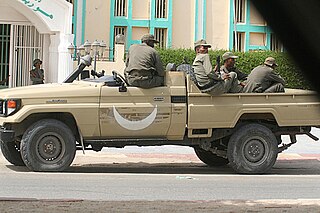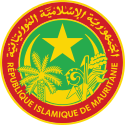
Mauritania is a presidential democracy, but has suffered from repeated military coups since its Independence in November 1960. For 18 years after independence, Mauritania was a one-party state under Moktar Ould Daddah. This was followed by decades of military rule. The first fully democratic presidential election in Mauritania occurred on 11 March 2007, which marked a transfer from military to civilian rule following the military coup in 2005. The election was won by Sidi Ould Cheikh Abdallahi, who was ousted by another military coup in 2008 and replaced by general Mohamed Ould Abdel Aziz. Mauretania underwent its first peaceful transition of power after the 2019 presidential election, although this was between two presidents of the ruling UPR party and former army generals.

The Union of the Forces of Progress is a centre-left to left-wing political party in Mauritania.

Colonel Ely Ould Mohamed Vall was a Mauritanian political and military figure. Following a coup d'état in August 2005, he served as the transitional military leader of Mauritania until 19 April 2007, when he relinquished power to an elected government.

The Military Council for Justice and Democracy was a supreme political body of Mauritania. It served as the country's interim government following the coup d'état which ousted the President Maaouya Ould Sid'Ahmed Taya on 3 August 2005. It was led by the former Director of the national police force, Colonel Ely Ould Mohamed Vall. After seizing power, it quickly pledged to hold elections within two years and promised that none of its own members would run.

Presidential elections were held in Mauritania on 11 March 2007. As no candidate received a majority of the votes, a second round was held on 25 March between the top two candidates, Sidi Ould Cheikh Abdallahi and Ahmed Ould Daddah. Abdallahi won the second round with about 53% of the vote and took office in April.

Ahmed Ould Daddah is a Mauritanian economist and a politician. He is a half-brother of Moktar Ould Daddah, the first President of Mauritania, and belongs to the Marabout Ouled Birri tribe. He is currently the President of the Rally of Democratic Forces (RFD) and was designated as the official Leader of the opposition following the 2007 presidential election, in which he placed second.

Sidi Mohamed Ould Cheikh Abdallahi was a Mauritanian politician who was President of Mauritania from 2007 to 2008. He served in the government during the 1970s, and after a long period of absence from politics he won the March 2007 presidential election, taking office on 19 April 2007. He was deposed in a military coup d'état on 6 August 2008.
Saleh Ould Hanenna is a former Mauritanian soldier and political figure.
In December 1984, Haidallah was deposed by Colonel Maaouya Ould Sid'Ahmed Taya, who, while retaining tight military control, relaxed the political climate. Ould Taya moderated Mauritania's previous pro-Algerian stance, and re-established ties with Morocco during the late 1980s. He deepened these ties during the late 1990s and early 2000s as part of Mauritania's drive to attract support from Western states and Western-aligned Arab states. Mauritania has not rescinded its recognition of Polisario's Western Saharan exile government and remains on good terms with Algeria. Its position on the Western Sahara conflict has been, since the 1980s, one of strict neutrality.

Yahya Ould Ahmed El Waghef is a Mauritanian politician. He was appointed as Prime Minister of Mauritania on 6 May 2008, serving until the August 2008 coup d'état. Yahya is also President of the National Pact for Democracy and Development (ADIL), and he was Secretary-General of the Presidency from 2007 to 2008.

The 2008 Mauritanian coup d'état was a military coup that took place in Mauritania on August 6, 2008, when President Sidi Ould Cheikh Abdallahi was ousted from power by the Armed Forces of Mauritania, led by a group of high-ranking generals he had dismissed from office earlier that day.

Mohamed Ould Abdel Aziz is a retired Mauritanian military officer and politician who served as the 8th President of Mauritania from 2009 to 2019.

Presidential elections were held in Mauritania on 18 July 2009. Mohamed Ould Abdel Aziz, who led the 2008 coup d'état, won a narrow first-round majority in the election, according to official results. A second round, if necessary, would have been held on 1 August 2009.

Presidential elections were held in Mauritania on 21 June 2014, with a second round planned for 5 July if no candidate received more than 50% of the vote. The result was a first round victory for incumbent President Mohamed Ould Abdel Aziz of the Union for the Republic, who received 82% of the vote. Most of the opposition parties boycotted the election.

Presidential elections were held in Mauritania on 22 June 2019, with a second round planned for 6 July if no candidate had received more than 50% of the vote. The result was a first round victory for Mohamed Ould Ghazouani who won with 52 percent of the vote. However, opposition rejected the results, calling it "another army coup." On 1 July 2019, Mauritania's constitutional council confirmed Ghazouani as president and rejected a challenge by the opposition.

Mohamed Ould Cheikh Mohamed Ahmed Ould Ghazouani, also known as Ghazouani and Ould Ghazouani, is a Mauritanian politician and retired army general who has served as the 9th President of Mauritania since 2019, and the chairperson of the African Union since February 2024.

Parliamentary elections were held in Mauritania on 13 and 27 May 2023, alongside regional and local elections.

Presidential elections were held in Mauritania on 29 June 2024. Incumbent Mohamed Ould Ghazouani won re-election for his second and final term as president, increasing his vote share by four points.
The second government of Mohamed Ould Bilal was the 17th government of the Islamic Republic of Mauritania, in office between 1 April 2022 and 3 July 2023. It was a coalition between the Union for the Republic, which rebranded itself as El Insaf in July 2022, and the Union for Democracy and Progress, whose leader Naha Mint Mouknass is the only member representing the party.

The Coordination of Parties of the Majority is an alliance of parties supporting the President of Mauritania Mohamed Ould Ghazouani. It was founded on 20 April 2021.















